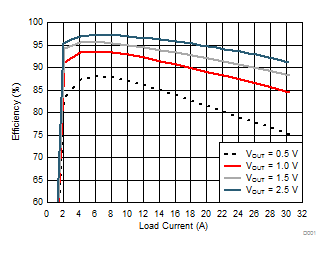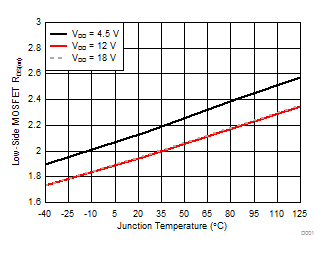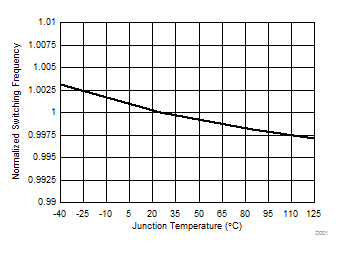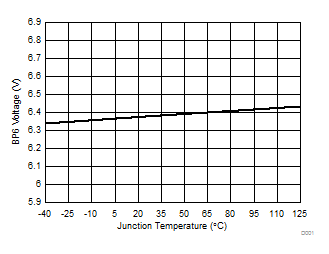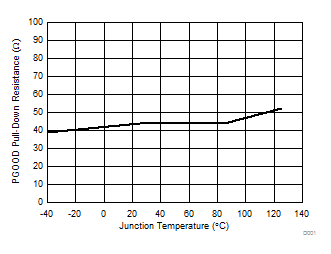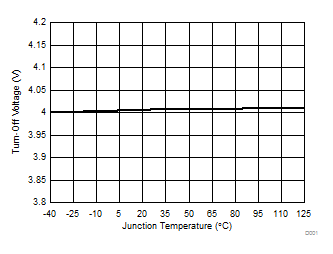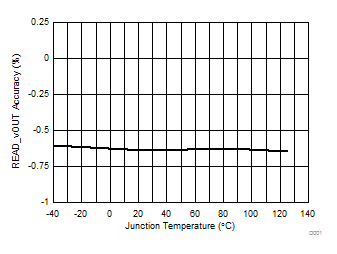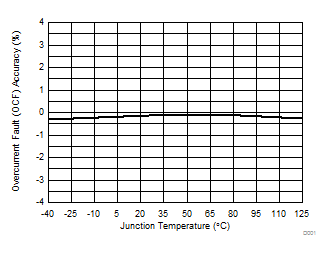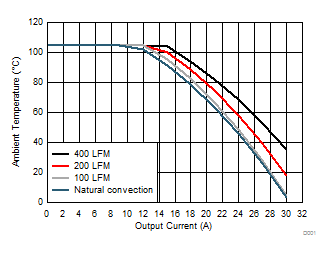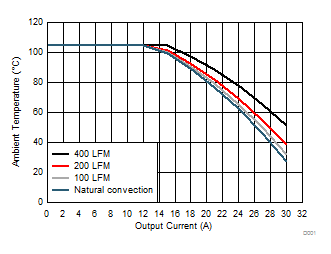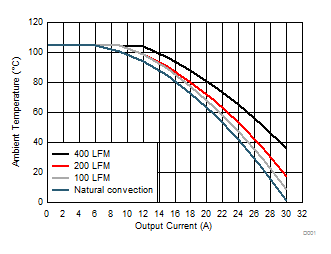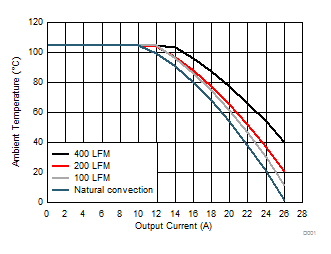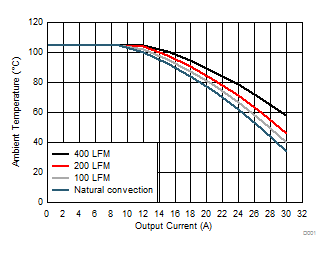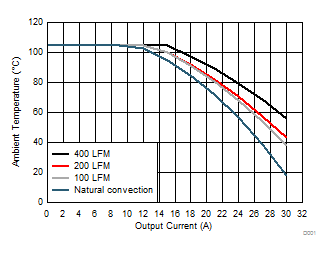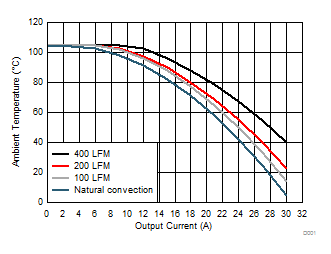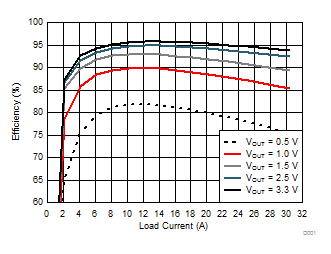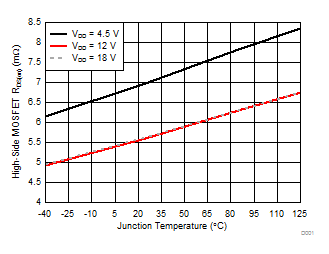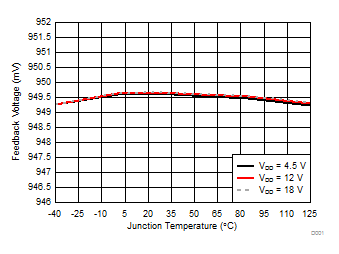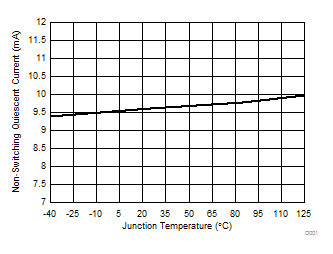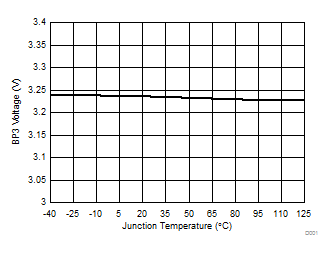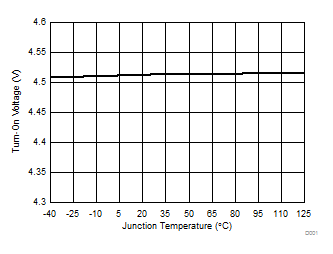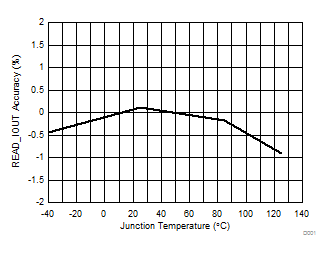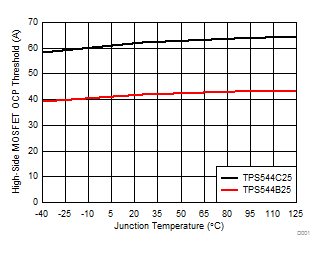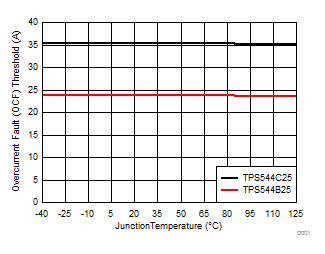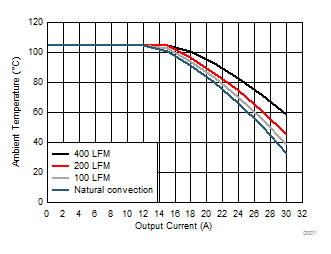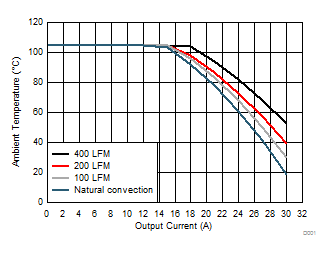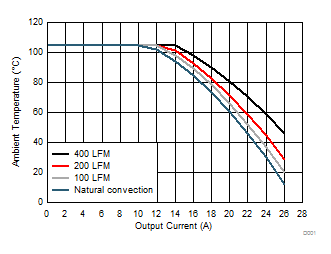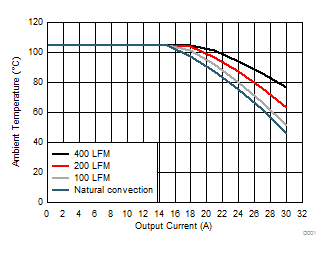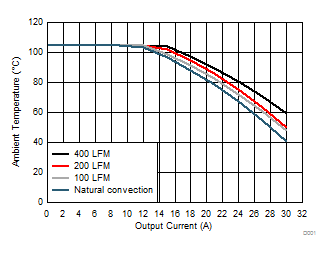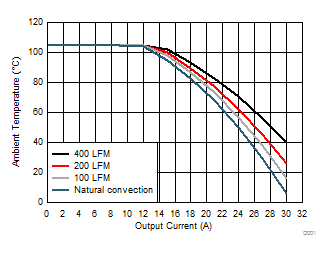| INPUT SUPPLY |
| VVDD |
Input supply voltage range |
|
4.5 |
|
18 |
V |
| VVIN |
Power stage voltage range |
|
4.5 |
|
18 |
| IVDD |
Input operating current |
Not switching |
|
9.5 |
12 |
mA |
| UVLO |
| VIN_ON |
Input turn on voltage |
Factory default setting |
|
4.5 |
|
V |
| Programmable range, 15 different settings |
4.25 |
|
7.75 |
| Accuracy |
–5% |
|
5% |
|
| VIN_OFF |
Input turn off voltage |
Factory default setting |
|
4 |
|
V |
| Programmable range, 15 different settings |
4 |
|
7.5 |
| Accuracy |
–5% |
|
5% |
|
| ERROR AMPLIFIER AND FEEDBACK VOLTAGE |
| VFB |
Feedback pin voltage |
Default setting |
940.5 |
950 |
959.5 |
mV |
| Setpoint range(1) |
0.5 |
|
1.5 |
V |
| VFB(ACC) |
Feedback pin voltage accuracy |
VFB = 600 mV, 0°C ≤ TJ ≤ 85°C(2) |
–0.5% |
|
0.5% |
% |
| 0.6 V ≤ VFB ≤ 1.5 V(1) |
–1.0% |
|
1.0% |
| 0.5 V ≤ VFB < 0.6 V(1) |
–1.5% |
|
1.5% |
| AOL |
Open-loop gain(1) |
|
80 |
|
|
dB |
| GBWP |
Gain bandwidth product(1) |
|
15 |
|
|
MHz |
| IFB |
FB pin input bias current |
VFB = 0.95 V |
–75 |
|
75 |
nA |
| ICOMP |
Sourcing |
VFB = 0 V |
1 |
|
|
mA |
| Sinking |
VFB = 1.2 V |
1 |
|
|
| VSET |
| IVset |
VSET pin current |
|
9.5 |
10.5 |
12 |
µA |
| VVset |
Initial VOUT setting |
RVset = 34.8 kΩ |
|
950 |
|
mV |
| VVset(dis) |
VSET disable threshold |
|
2.41 |
|
|
V |
| OSCILLATOR |
| FSW |
Adjustment range(2) |
|
200 |
|
1000 |
kHz |
| Switching frequency |
RRT = 40.2 kΩ |
425 |
500 |
575 |
kHz |
| VRMP |
Ramp peak-to-peak(1) |
|
VVDD/9.3 |
VVDD/8.5 |
VVDD/7.6 |
V |
| VVLY |
Valley voltage(1) |
|
|
0.75 |
|
| SYNCHRONIZATION |
| VIH(sync) |
High-level input voltage |
|
2.0 |
|
|
V |
| VIL(sync) |
Low-level input voltage |
|
|
|
0.80 |
| Tpw(sync) |
Sync input minimum pulse width |
|
|
|
100 |
ns |
| fSYNC |
Synchronization frequency |
|
200 |
|
1200 |
kHz |
| ΔfSYNC |
SYNC pin frequency range from free running frequency(1) |
|
-20% |
|
20% |
|
| RESET_B |
| VIH(reset) |
High-level input voltage(1) |
3.3-V and 5-V logic |
2.1 |
|
|
V |
| 1.8-V logic (factory default) |
1.2 |
|
|
| VIL(reset) |
Low-level input voltage |
3.3-V and 5-V logic |
|
|
0.8 |
| 1.8-V logic (factory default) |
|
|
0.5 |
| tPW(reset) |
Minimum RESET_B pulse width |
RVSET = 34.8 kΩ |
200 |
|
|
ns |
| Vvout_command(reset) |
Output voltage after reset triggered |
RVSET = 34.8 kΩ |
|
950 |
|
mV |
| BP6 REGULATOR |
| VBP6 |
Regulator output voltage |
IBP6 = 10 mA |
5.85 |
6.4 |
6.9 |
V |
| VBP6(do) |
Regulator dropout voltage |
VVIN – VBP6, VVDD = 4.5 V, IBP6 = 25 mA |
50 |
200 |
400 |
mV |
| IBP6SC |
Regulator short-circuit current(1) |
VVDD = 12 V |
|
150 |
|
mA |
| VBP6UV |
Regulator UVLO voltage(1) |
|
|
3.73 |
|
V |
| VBP6UV(hyst) |
Regulator UVLO voltage hysteresis(1) |
|
|
320 |
|
mV |
| BOOTSTRAP |
| VBOOT(drop) |
Bootstrap voltage drop |
IBOOT = 5 mA |
|
|
125 |
mV |
| BP3 REGULATOR |
| VBP3 |
3-V regulator output voltage |
VVDD ≥ 4.5 V, IBP3 = 5 mA |
3.0 |
3.2 |
3.4 |
V |
| IBP3SC |
3-V regulator short-circuit current(1) |
|
|
35 |
|
mA |
| PWM |
| tON(min) |
Minimum controllable pulse width(1) |
|
|
|
100 |
ns |
| SOFT-START |
| TON_RISE |
Soft-start time |
Factory default setting |
|
5 |
|
ms |
| Programmable range, 16 discrete settings(1)(3) |
0 |
|
100 |
| Accuracy, TON_RISE = 1 ms |
-10 |
|
10 |
% |
| TON_MAX_FAULT_LIMIT |
Upper limit on the time to power up the output |
Factory default setting |
|
100 |
|
ms |
| Programmable range, 16 discrete settings(1)(4) |
0 |
|
100 |
| Accuracy(1) |
–10 |
|
10 |
% |
| TON_DELAY |
Turn-on delay |
Factory default setting |
|
0 |
|
ms |
| Programmable range, 16 discrete settings(1) |
0 |
|
100 |
| Accuracy(1) |
–10 |
|
10 |
% |
| SOFT-STOP |
| TOFF_FALL |
Soft-stop time |
Factory default setting(5) |
|
0 |
|
ms |
| Programmable range, 16 discrete settings(1)(5) |
0 |
|
100 |
| Accuracy, TOFF_FALL = 1 ms |
–10 |
|
10 |
% |
| TOFF_DELAY |
Turn-off delay |
Factory default setting |
|
0 |
|
ms |
| Programmable range, 16 discrete settings(1) |
0 |
|
100 |
| Accuracy(1) |
–10 |
|
10 |
% |
| SS PIN FOR INITIAL SOFT-START PROGRAMMING |
| ISS |
SS pin current |
|
9.5 |
10.5 |
12 |
µA |
| VSS(ivlow) |
SS pin invalid low voltage |
|
|
|
0.03 |
V |
| VSS(ivhigh) |
SS pin invalid high voltage |
|
2.40 |
|
|
| REMOTE SENSE AMPLIFIER |
| VDIFFO(err) |
Error voltage from DIFFO to (VOUTS+ – VOUTS–) |
(VOUTS+ – VOUTS–) = 0.6 V |
–5 |
|
5 |
mV |
| (VOUTS+ – VOUTS–) = 1.2 V |
–7 |
|
7 |
| (VOUTS+ – VOUTS–) = 3.0 V |
–15 |
|
15 |
| ARSA |
Differential gain |
|
0.995 |
|
1.005 |
V/V |
| BWRSA |
Closed-loop bandwidth(1) |
|
2 |
|
|
MHz |
| VDIFFO(max) |
Maximum DIFFO output voltage |
|
|
|
VBP6–0.2 |
V |
| IDIFFO |
DIFFO sourcing current |
|
1 |
|
|
mA |
| DIFFO sinking current |
|
1 |
|
|
| POWER STAGE |
| RHS |
High-side power device on-resistance |
VVDD ≥ 12 V, TJ = 25°C |
|
5.5 |
|
mΩ |
| RLS |
Low-side power device on-resistance |
VVDD ≥ 12 V, (BOOT - SW) = 6.5 V, TJ = 25°C |
|
2.0 |
|
| CURRENT SENSE AMPLIFIER |
| tLS(minCS) |
Minimum LDRV pulse width for valid overcurrent and current mornitoring(1) |
|
|
400 |
|
ns |
| LOW-SIDE CURRENT LIMIT PROTECTION |
| tOFF(OC) |
Off time between restart attempts(1) |
|
|
7 × TON_RISE |
|
ms |
IOUT_OC_FAULT_
LIMIT |
Output current overcurrent fault threshold |
Factory default setting |
TPS544C25 |
|
36 |
|
A |
| Programmable range |
5 |
|
40 |
| Factory default setting |
TPS544B25 |
|
24 |
|
| Programmable range |
5 |
|
36 |
IOUT_OC_WARN_
LIMIT |
Output current overcurrent warning threshold |
Factory default setting |
TPS544C25 |
|
34 |
|
| Programmable range |
4 |
|
39.5 |
| Factory default setting |
TPS544B25 |
|
22 |
|
| Programmable range |
4 |
|
35.5 |
| IOC(acc) |
Output current overcurrent fault accuracy |
IOUT ≥ 20 A |
–10% |
|
+10% |
|
| Output current overcurrent warning accuracy |
IOUT ≥ 20 A(1) |
–10% |
|
+10% |
| HIGH-SIDE SHORT CIRCUIT PROTECTION |
| IHSOC |
High-side short-circuit protection peak current threshold |
|
TPS544C25 |
40 |
|
75 |
A |
| TPS544B25 |
33 |
|
66 |
| POWER GOOD (PGOOD) AND OVERVOLTAGE/UNDERVOLTAGE WARNING |
| VPG(hyst) |
PGOOD and over/under votlage warning threshold hysteresis at DIFFO pin |
VOUT_SCALE_LOOP = 1.0 |
15 |
|
75 |
mV |
| RPGOOD |
PGOOD pull-down resistance |
VDIFFO = 0 V, IPGOOD = 5 mA |
30 |
45 |
60 |
Ω |
| IPGOOD(lk) |
PGOOD pin leakage current |
VPGOOD = 5 V |
|
|
15 |
µA |
| VOUT_OV_WARN_LIMIT |
Overvoltage warning threshold at DIFFO pin |
VOUT_SCALE_LOOP = 1.0, factory default setting |
1165 |
1201 |
1237 |
mV |
| VOUT_SCALE_LOOP = 1.0, programmable range(1) |
527 |
|
1797 |
| VOUT_UV_WARN_LIMIT |
Undervoltage warning threshold at DIFFO pin |
VOUT_SCALE_LOOP = 1.0, factory default setting |
600 |
631 |
650 |
| VOUT_SCALE_LOOP = 1.0, programmable range(1) |
350 |
|
1428 |
| VUVOV(warnhyst) |
Over/under votlage warning threshold hysteresis at DIFFO pin |
VOUT_SCALE_LOOP = 1.0(1) |
15 |
|
75 |
| OUTPUT OVERVOLTAGE AND UNDERVOLTAGE FAULT PROTECTION |
| VOUT_OV_FAULT_LIMIT |
Overvoltage fault threshold at DIFFO pin |
VOUT_SCALE_LOOP = 1.0, factory default setting |
1243 |
1281 |
1330 |
mV |
| VOUT_SCALE_LOOP = 1.0, programmable range(1) |
529 |
|
1799 |
| VOUT_UV_FAULT_LIMIT |
Undervoltage fault threshold at DIFFO pin |
VOUT_SCALE_LOOP = 1.0, factory default setting |
550 |
594 |
610 |
| VOUT_SCALE_LOOP = 1.0, programmable range(1)(4) |
346 |
|
1426 |
| VUVOV(flthyst) |
Over/under votlage fault threshold hysteresis at DIFFO pin |
VOUT_SCALE_LOOP = 1.0(1) |
15 |
|
75 |
| OUTPUT VOLTAGE TRIMMING |
VOUT_
TRANSITION_
RATE |
Output voltage transition rate |
Factory default setting |
|
1.0 |
|
mV/µs |
| Programmable range, 8 discrete settings |
0.067 |
|
1.5 |
| Accuracy |
–10% |
|
10% |
|
VOUT_SCALE_
LOOP |
Feedback loop scaling factor |
Factory default setting |
|
1 |
|
|
| Programmable range, 3 discrete settings |
0.25 |
|
1 |
| VOUT_COMMAND |
Output voltage programmable register value, multiply by 2-9 to get output voltage |
Factor default setting |
|
486 |
|
|
| VOUT_SCALE_LOOP = 1.0, programmable range(1) |
256 |
|
768 |
| VOUT_SCALE_LOOP = 0.5, programmable range(1) |
512 |
|
1536 |
| VOUT_SCALE_LOOP = 0.25, programmable range(1) |
1024 |
|
3072 |
| TEMPERATURE SENSE AND THERMAL SHUTDOWN |
| TSD |
Junction thermal shutdown temperature(1) |
|
135 |
145 |
155 |
°C |
| THYST |
Junction thermal shutdown hysteresis(1) |
|
15 |
20 |
25 |
| VTSNS |
Voltage range on TSNS/SS pin(1) |
|
0 |
|
1.00 |
V |
| OT_FAULT_LIMIT |
External overtemperature fault limit(1) |
Factory default setting |
|
125 |
|
°C |
| Programmable range |
120 |
|
165 |
| OT_WARN_LIMIT |
External overtemperature warning limit(1) |
Factory default setting |
|
100 |
|
| Programmable range |
100 |
|
140 |
| TOT(hys) |
External overtemperature fault, warning hysteresis(1) |
|
15 |
20 |
25 |
| MEASUREMENT SYSTEM |
| MVOUT(rng) |
Output voltage measurement range |
|
0.5 |
|
5.8 |
V |
| MVOUT(acc) |
Output voltage measurement accuracy |
|
–2.0% |
|
2.0% |
|
| MVOUT(lsb) |
Output voltage measurement bit resolution(1) |
|
|
1.953 |
|
mV |
| MIOUT(rng) |
Output current measurement range |
|
0 |
|
40 |
A |
| MIOUT(acc) |
Output current measurement accuracy |
IOUT ≥ 20 A |
–15% |
|
15% |
|
| 3 A ≤ IOUT < 20 A(1) |
–3 |
|
3 |
A |
| MIOUT(lsb) |
Output current measurement bit resolution(1) |
|
|
62.5 |
|
mA |
| MTSNS(rng) |
External temperature sense range(1) |
|
–40 |
|
165 |
°C |
| MTSNS(acc) |
External temperature sense accuracy(1) |
-40°C ≤ TJ(sensor) ≤ 165°C |
–5 |
|
5 |
| MTSNS(lsb) |
External temperature sense bit resolution(1) |
|
|
1 |
|
| PMBus INTERFACE ADDRESSING |
| IADD |
Address pin bias current |
|
9.5 |
10.5 |
12 |
µA |
| VADD(ivlow) |
Address pin illegal low voltage |
|
|
|
0.05 |
V |
| VADD(ivhigh) |
Address pin illegal high voltage |
|
2.40 |
|
|
| PMBus™ INTERFACE |
| VIH |
Input high voltage, CLK, DATA, CNTL |
3.3-V/5-V logic |
2.1 |
|
|
V |
| 1.8-V logic (factory default) |
1.2 |
|
|
| VIL |
Input low voltage, CLK, DATA, CNTL |
3.3-V/5-V logic |
|
|
0.8 |
V |
| 1.8-V logic (factory default) |
|
|
0.5 |
| IIH |
Input high level current, CLK, DATA |
|
-10 |
|
10 |
µA |
| IIL |
Input low level current, CLK, DATA |
|
-10 |
|
10 |
µA |
| ICNTL |
CNTL pin pull-up current |
|
5 |
|
10 |
µA |
| VOL |
Output low level voltage, DATA, SMBALERT |
VDD > 4.5 V, input current to DATA, SMBALERT = 4mA |
|
|
0.4 |
V |
| IOH |
Output high level open drain leakage current, DATA, SMBALERT |
Voltage on DATA, SMBALERT = 5.5V |
-10 |
|
10 |
µA |
| IOL |
Output low level open drain leakage current, DATA, SMBALERT |
Voltage on DATA, SMBALERT = 0.4V |
4.0 |
|
|
mA |
| IPMB |
PMBus operating frequency range |
Slave mode |
10 |
|
400 |
kHz |
